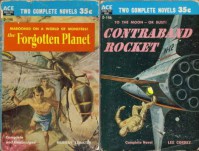Showing their age

Part of the fun for me in reading Ace Doubles is the pleasure of sampling science fiction written by people who had different perspectives and views from those of writers today. This is most obvious in the plot-driven nature of the novels, in which character development takes a back seat (if not escorted out of the room altogether) in favor of the premise and the resulting action. It's also interesting to read them as artifacts reflecting the concerns of their times, which may seem dated and quaint to us today but were very real to them. In that respect their very datedness can make them worthwhile reading.
This datedness emerges in ways that are not as quaint or appealing, however, as most of these novels about the future embody the social attitudes of the authors' time. This was especially evident in the latest pair I read, which offered two very different adventures. The first one was G. Harry Stine's Contraband Rocket. Published under Stine's pseudonym "Lee Corey"), it's about a group of near-future rocket enthusiasts who decide to refurbish a decommissioned rocket and travel to the moon. As a rocket engineer who played a major role in model rocketry, Stine's novel captures well the passion of a group of enthusiasts for the dream of flying in space and makes for interesting for this reason alone. Yet Stine's subplot, in which the wife of one of the central characters leaves him over his obsession with the project, absolutely grates today. What could have added a sense of emotional drama becomes instead a vehicle for taking some Scientology-esque digs at psychiatry (in Stine's future, divorce proceedings are a pretense for court-mandated brainwashing) culminating in an ending in which the wife realizes that it's really her problem and not his. Once again, the Fifties-era patriarchy emerges triumphant.
Ironically, the issue of datedness was less evident in the other novel, even though it was the older of the two works. Murray Leinster's The Forgotten Planet was a fix-up of three short stories two of which were written in the early 1920s. In it a terraforming project is unintentionally abandoned midway through its centuries-long process due to a lost record, leaving a planet seeded by Terran plants and insects that without the presence of other animals grow unchecked. After a space liner crashes on the planet, the savage descendants of its survivors must cope with swarms of foot-long ants, wasps the size of sofas, and spiders that would barely fit comfortably in a garage. Like the writers of the "big-bug" movies of the 1950s Leinster glosses over the impossibility of insect physiology at that size, preferring to focus on his tale of a human (male, of course), who gradually rediscovers the value of tools and leads his tribe to survival. It's a gripping adventure (if a bit monotonous) but it ends with a casual embrace of hunting that is increasing at odds with our ethical development today. Like Stine Leinster is reflecting the attitudes of his class and time, but it's still jarring to see supposedly advanced humans embrace the slaughtering of unique species so eagerly.






